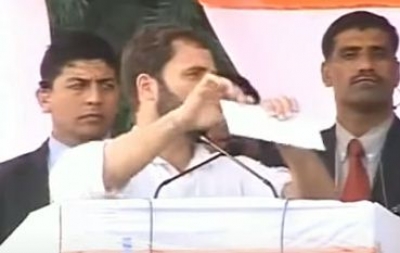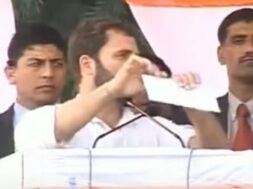
Manas Dasgupta
NEW DELHI, Mar 23: The former Congress president Rahul Gandhi is facing the risk of being disqualified as a Member of Parliament from Wayanad in Kerala following his conviction by the Surat sessions court on Thursday in the “Modi Surname” case and sentenced to two years in jail.
Though the court also suspended the sentence for 30 days giving him time to appeal to the higher courts and granted him bail, the dramatics the Congress leader created a decade ago in tearing the copy of an ordinance may now haunt him to lose the Parliamentary seat.
Under Section 8(3) of the Representation of the People Act, 1951, the moment a Member of Parliament is convicted of any offence and sentenced for at least two years, she or he attracts disqualification. According to experts, the Lok Sabha Secretariat can disqualify Rahul Gandhi on the basis of the Surat court order and declare his Wayanad constituency vacant and order by-election.
An ordinance the then Congress government headed by Manmohan Singh in 2013 could have saved Rahul Gandhi from the present situation, but Gandhi himself had dramatized the event of publicly declaring his dislike for “protecting the political criminals” and forced his party government to withdraw the ordinance.
He might face “immediate disqualification” after the Surat court verdict as per a landmark Supreme Court judgment of July 10, 2013, which negated the previous position that allowed convicted MPs, MLAs, MLCs to retain their seats until they had exhausted all judicial remedies, till the Supreme Court of India.
The Manmohan Singh government that was in power at the time brought in an ordinance against the judgment, but Rahul Gandhi’s public chastising including the famous incident of him tearing into the ordinance – had made the government roll it back.
It was in the Lily Thomas vs Union of India case that the Supreme Court ruled that “any MP, MLA or MLC who is convicted of a crime and given a minimum of 2 years’ jail loses membership of the House with immediate effect.” It struck down Section 8(4) of the Representation of the People Act, which allowed elected representatives three months to appeal their conviction, as “unconstitutional.”
Two months later, the UPA government passed an ordinance to negate the order. It was seen as a move to protect RJD supremo and Congress ally Lalu Prasad from disqualification if proved guilty in the fodder scam case. Veteran Congress leader and Rajya Sabha MP Rashid Masood was already convicted in a corruption case, and faced immediate disqualification.
The Opposition of the time, including the BJP and the Left, severely criticised the Congress-led government over the ordinance, accusing it of protecting convicted lawmakers. Days after the ordinance was passed, on September 27, Rahul made a surprise and dramatic entry at a press event of the party in Delhi. There, in a major embarrassment for PM Manmohan Singh and his Cabinet colleagues, Rahul publicly castigated the UPA government over the ordinance, calling it a “complete nonsense” and said it should be “torn and thrown out.”
Going on to speak at the press conference, Rahul said, “I am telling you what is happening internally – we need to do this [bring in an ordinance] because of political considerations. Everybody does this. The Congress party does this, the BJP does this, the Janata Dal does this, the Samajwadi Party does this and everybody does this. And there is a time to stop this nonsense.”
He added: “I really feel it is about time that political parties, mine and all others, stop making these kinds of compromises because if we want to actually fight corruption in this country, whether it is us, the Congress party, or the BJP, we cannot continue making these small compromises… I am interested in what the Congress party is doing, I am interested in what our government is doing and I feel, personally feel, what our government has done as far as this ordinance is concerned is wrong.”
The Congress believed then that Rahul was attempting to distance himself from the UPA government’s “perceived omissions and commissions.” With less than a year to go for the 2014 elections and with the government battling a string of corruption allegations, such as the alleged 2G scam and AgustaWestland scam, Rahul, they said, hoped his taking the moral high ground would help the party go to the “electorate with a clean image”.
The result, however, was the opposite. The incident, which happened at a time when Manmohan Singh was on an official visit to the US, was seen as a blow to the PM’s authority and a sign that the government and party were pulling in different directions.
A day before Rahul’s outburst, BJP leaders L K Advani, Sushma Swaraj and Arun Jaitley had met then President Pranab Mukherjee and submitted a memorandum asking for the ordinance to be withdrawn. The President had then summoned the law minister, the home minister and parliamentary affairs minister and asked them what the government planned to do if the Supreme Court struck the ordinance down. The ministers reportedly came back from the meeting and were considering whether the Cabinet should reconsider the ordinance and withdraw it.
Rahul is believed to have sent a letter to the PM in this regard, but he reportedly went ahead with his dramatic press conference without waiting for a reply from Manmohan Singh.
Later, in a statement released just before his meeting with the then US president Barack Obama, Manmohan Singh said, “The ordinance cleared by the Cabinet pertaining to the Representation of the People Act has been a matter of much public debate. The Congress vice-president has also written to me on the issue and also made a statement. The government is seized of all these developments. The issues raised will be considered on my return to India after due deliberations in the Cabinet.”
On October 2, after he had returned, Manmohan Singh met Rahul before a meeting of the Congress Core Group, where it was decided that it would be better for the government to withdraw the ordinance. The next day, the government withdrew the ordinance.
But while the Surat court verdict has given fuel to the BJP which has been batting for his removal for over two months, the Union law ministry’s handling of the case of an MP from Lakshadweep provides an interesting precedent to save Rahul Gandhi from immediate disqualification. Lok Sabha officers dealing with disqualification procedures said there was “no rule book as such” for disqualification and it could differ from leader to leader. “Show me your face and I will show you the rule book,” one of them emphatically said.
In case of Rahul Gandhi’s conviction, they said the usual practice is to wait till the 30-day period is over to take a call. The picture, though, can change if the Surat Court is overturned by Mr Gandhi’s appeal in a higher court.
Recently, the Law Ministry recommended the reinstatement of Lakshadweep’s NCP MP PP Mohammed Faizal after his conviction in an attempt to murder case was put on hold by the Kerala High Court. The MP was initially convicted by a court in Lakshadweep in January. But a week later, the Kerala High Court had suspended the conviction and said his disqualification as a Lok Sabha member would no longer be valid.
The Election Commission, meanwhile, had announced by-polls in the constitution of Mr Faizal. The MP challenged the decision in Supreme Court, following which the court asked for a cancellation of the Commission’s order. As for Rahul Gandhi, sources in the Congress concede that he faces immediate disqualification if he does not challenge the verdict. Gandhi, they said, will do exactly that and will not be attending parliament for a while.
Mr Gandhi was found guilty and sentenced to two years in prison today in a four-year-old criminal defamation case over his remarks about Prime Minister Narendra Modi’s surname. Mr Gandhi had apparently said, “How come all thieves have the common surname Modi?” after which the case was filed by BJP MLA and former Gujarat minister Purnesh Modi in Gujarat.
Experts also said a two-year sentence in a criminal defamation case under Section 499 of the Indian Penal Code, under which Gandhi was convicted, was “extremely rare.”
But the BJP leader Ravi Shankar Prasad intensifying his attack on Gandhi said, “Modis are a community, not just a surname. They are sportsmen, politicians, doctors, and businessmen. If you brand a certain surname as thieves, then it is clearly defamatory. Rahul Gandhi said he believes in truth and nonviolence. Does believing in truth and nonviolence mean you will insult the people and give caste-related abuses?” he asked.













